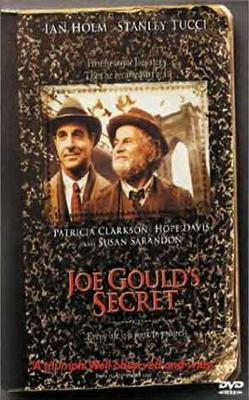"A Silent, Empty Failure"

| None | Light | Moderate | Heavy | |
|---|---|---|---|---|
| Language | ||||
| Violence | ||||
| Sex | ||||
| Nudity |
What You Need To Know:
Despite a reference to “the Infinite” and to the “grace of God,” JOE GOULD’S SECRET presents a mostly humanist face. It’s the face of the New York literary establishment after the Second World War – a pseudo-intellectual group that has left in its wake mostly broken promises, culturally, socially and politically. The bright promise of both men’s writing careers ends in a kind of empty, silent failure. Containing some foul language and two scenes with full male nudity, this character study probably will leave many viewers with a deep sense of disappointment and regret.
Content:
(HH, RoRo, B, C, Ab, LLL, NNN, AA, D, M) Humanist, romantic worldview with some moral elements, minor Christian references & a couple somewhat ambiguous anti-Christian moments; 22 obscenities & 9 profanities plus a little crude talk; no violence; no sex; full male nudity in two scenes; alcohol use & drunkenness; smoking; and, lying.
More Detail:
Actor-director Stanley Tucci (THE BIG NIGHT and THE IMPOSTERS) obviously prefers character studies to message pictures. That’s the impression he’s built with the three movies he’s directed so far. THE BIG NIGHT was a character study about two brothers who are Italian immigrants trying to run a gourmet restaurant. THE IMPOSTERS was about two struggling actors who end up as stowaways on a cruise ship. JOE GOULD’S SECRET is based on a true story about the relationship between an editor for NEW YORKER magazine and an elderly bohemian writer who lives on the streets. All three of these movies lack a central message, or premise, that drives their stories, although each one of them seem to say that surviving an unfair world is everything.
Joe Mitchell (Tucci), an editor for the NEW YORKER, first notices Joe Gould (Ian Holm), at a diner in the late 1940s. The bearded bohemian sits down for a free bowl of soup. He starts to pour a whole bottle of ketchup into the soup before the owner behind the counter stops him. Later, Mitchell finds out that Gould is a well-known streetbum (even the famous poets e.e. cummings and Ezra Pound know him), who’s supposedly collecting thousands of conversations he’s heard on the street. Often noisy and obnoxious, Gould also sometimes launches into lyrical observations about people and the world. One of the best lines is his comment, “In the eyes of the Infinite, all pride is just dust and ashes.” Gould also bums money from people, asking them, “Could you give something to the Joe Gould Fund?”
Eventually, Gould lets Mitchell read some of the essays he’s stashed around town. Mitchell runs a story in the NEW YORKER about Gould, and Gould becomes the talk of the town. In fact, the article earns Gould a secret patron, whose small amount of monthly cash allows Gould to rent a room. Even so, Gould keeps giving Mitchell the runaround when it comes to showing him his magnum opus, the oral history he’s written of the things people say in ordinary life. He also pesters Mitchell, who’s become Gould’s best friend for life. The movie hints that part of Mitchell’s annoyance with Gould is that he sees himself in Joe Gould’s frazzled countenance, the countenance of a frustrated writer who would love to publish a book, and win acclaim, but simply can’t put anything so cohesive as that down on paper. Like the two brothers in THE BIG NIGHT, their relationship becomes strained until they meet together in the movie’s final major scene.
Despite some the reference to “the Infinite” and a reference to the “grace of God,” JOE GOULD’S SECRET presents a mostly humanist, romantic face. It’s the face of the New York literary establishment that developed in America after the Second World War – a pseudo-intellectual group that has left in its wake mostly broken promises, culturally and socially as well as politically. Thus, even though Joe Gould acknowledges the Infinite, he also makes boisterous declarations like, “In the winter I’m a Buddhist; in the summer I’m a nudist!” At one point, he even sings, “There are fleas on me. There are fleas on you. But there ain’t no fleas on Jesus.” This obtuse dialogue is coupled with some foul language and two scenes depicting full male nudity.
As in his THE BIG NIGHT, Tucci ends JOE GOULD’S SECRET with a silent moment (but a much shorter one than in the earlier movie) between Gould and Mitchell. Gould has been sent to a kind of mental home for elderly people who aren’t altogether there. In fact, the bright promise of both men’s writing careers ends in a kind of empty, silent failure. The directing by Tucci seems too distant to make anything more out of this character study other than a deep sense of disappointment and regret. The truth, goodness and beauty of God does not factor much into this picture.



 - Content:
- Content: 



